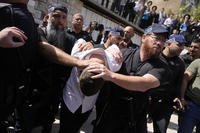U.S. and coalition forces scaled back partnering and advising operations with the Afghan National Security Forces on Sunday in response to protests to the anti-Muslim You Tube film and the spike of insider attacks, including the recent destruction of six Marine Harrier jets.
Commanders restricted the level of training and advising U.S. and coalition forces can provide to the Afghan National Army for the second time this year.
Lt. Gen. James Terry, the deputy commanding general of U.S. Forces in Afghanistan, issued an order Sunday restricting advising and training to only those units at the battalion level and above. A battalion in the Afghan National Army is called a Kandak. This includes patrols Afghan and NATO forces have often driven and walked together.
Aghan and NATO commanders can request partnerships with units below the Kandak-level, but those requests must receive approval from a regional commander on a “case-by-case basis,” according to a statement released by International Security Assistance Forces headquarters.
The U.S. strategic withdrawal from Afghanistan scheduled to be completed by 2014 depends on the stand up of the Afghan National Army. Any restrictions imposed on the U.S. and Afghan military partnering and advising will slow down the progress of the Afghan military and make it harder for the U.S. to leave Afghanistan on schedule.
A spike of insider attacks, or attacks executed by supposed Afghan soldiers and policemen, have killed 51 ISAF troops this year, mostly Americans. NATO and Afghan officials have responded by re-examining the vetting process to clear Afghan army and police recruits, and in some cases, freezing training.
A brazen attack Sept. 14 by 15 insurgents in southwest Afghanistan at Camp Bastion left two Marines dead including the commanding officer of a Harrier squadron. The insurgents destroyed six Harrier jump jets and damaged two others.
Anti-American protests that have swept the Muslim world in response to the You Tube film called the “Innocence of Muslims” have reached Afghanistan. Violent protests sprung up in Kabul, but U.S. leaders have commended their Afghan counterparts for keeping the protests under control compared to the chaos seen in Libya and Egypt.
U.S. Gen. John Allen, U.S commander in Afghanistan, ordered his operational commanders in Afghanistan to review force protection and “tactical activities in the light of the current circumstances,” according to an ISAF statement.
“Recent events outside of and inside Afghanistan related to the 'Innocence of Muslims' video plus the conduct of recent insider attacks have given cause for ISAF troops to exercise increased vigilance and carefully review all activities and interactions with the local population,” the ISAF statement read.
Allen’s order will change where and how some NATO troops operate in Afghanistan as long as these insider attacks and protests persist, ISAF officials said. Ground commanders will take steps to protect troops while also keeping the mission’s success in mind, ISAF officials said.
These new directives come as the last of the 33,000 U.S. surge forces return to the U.S. A seeming loss of trust between the U.S. and Afghan forces come as the number of U.S. troops deployed to Afghanistan keeps drawing down putting those remaining troops in more vulnerable scenarios.
Chairman of the Joint Chiefs of Staff Gen. Martin Dempsey called the rash of insider attacks “a very serious threat” to the NATO war effort and the U.S. withdrawal from Afghanistan.
There is no timetable set for when these training restrictions could be lifted.





























